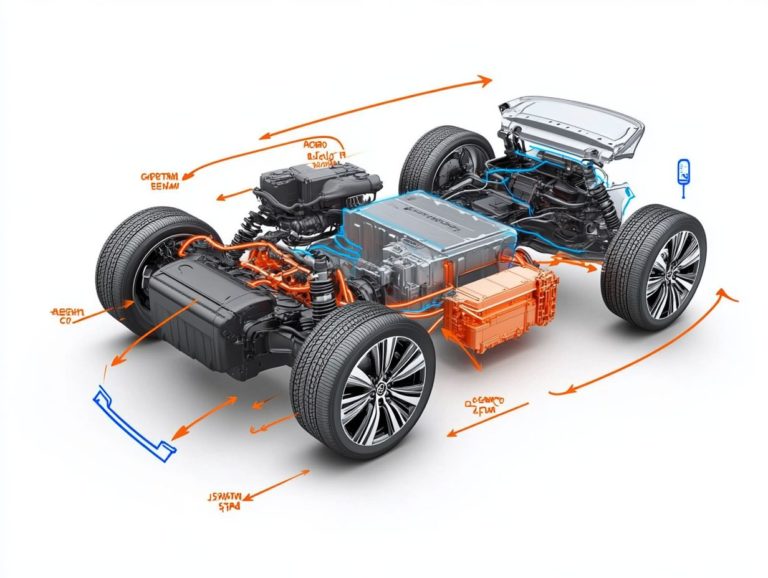how to inspect your ev battery health
In the ever-evolving realm of electric vehicles (EVs), grasping the nuances of battery health is essential for optimizing both performance and longevity.
This article delves into the meaning of EV battery health, underscores the importance of regular inspections, and equips you with the knowledge to identify potential issues before they escalate.
You ll find a comprehensive, step-by-step guide for inspecting your battery, along with practical tips to maintain and enhance its condition.
Keeping your EV s battery in peak form boosts its efficiency and contributes to significant savings over time.
Jump in now to learn how to keep your vehicle running at its best!
Contents
- Key Takeaways:
- Understanding EV Battery Health
- Why Regular Inspections are Important
- Signs of Potential Battery Issues
- How to Inspect EV Battery Health
- Maintaining and Improving EV Battery Health
- Frequently Asked Questions
- 1. Why is it important to check your EV battery health?
- 2. How often should I check my EV battery health?
- 3. What signs indicate my EV battery health may be declining?
- 4. How can I check my EV battery health?
- 5. Can I check my EV battery health myself?
- 6. What should I do if I see an issue with my EV battery health?
Key Takeaways:
Regular inspections are crucial for maintaining the health of your EV battery. They help identify potential issues and extend its lifespan.
Understanding the signs of potential battery issues is important. It helps catch problems early and avoid costly repairs.
By following a step-by-step guide and implementing tips for maintenance, you can improve your EV battery health and ensure optimal performance.
Understanding EV Battery Health
Understanding EV battery health is essential for ensuring the longevity and optimal performance of electric vehicles (EVs) like Tesla, Nissan Leaf, Rivian, and Chevrolet Bolt.
The health of the battery directly impacts important aspects such as battery capacity, power output, and energy efficiency elements that are vital in today’s advanced automotive landscape.
Battery management systems are tools that help monitor and maintain your battery’s performance. They ensure that the lithium-ion batteries powering your vehicle maintain their performance over time.
A solid grasp of battery degradation processes allows you to tackle issues related to battery lifespan and thermal monitoring, ensuring your vehicle remains in peak condition.
What is EV Battery Health?
EV battery health refers to the overall condition and performance of the battery system within your electric vehicle. It encompasses aspects such as capacity, power output, and how the battery degrades over time.
Several key components significantly influence this health. For instance, the quality of materials used in the battery cells, the operating temperature during charging and discharging cycles, and how frequently you use your vehicle all play crucial roles.
A robust battery management system is essential; it monitors individual cell performance, ensures balanced charging, and prevents potential issues like overheating. Utilizing diagnostic tools is equally important for assessing battery performance and ensuring that safety standards are met.
This gives you the power to make informed decisions about maintenance and replacement. When you consider all these elements together, they not only extend your battery’s lifespan but also optimize your overall driving experience.
Why Regular Inspections are Important
Regular inspections are vital to keeping your EV battery in top shape while ensuring compliance with safety standards and environmental regulations.
By conducting these inspections, you can identify potential issues before they escalate, helping safeguard the longevity and efficiency of your battery system.
These assessments provide important quality control insights, offering valuable information on any manufacturing defects that could compromise battery performance.
Additionally, consumer testing is essential for understanding how to seamlessly integrate these inspections into your routine maintenance practices.
Benefits of Inspecting EV Battery Health
Inspecting the health of your EV battery brings a multitude of benefits, including an extended battery lifespan, improved performance, and a commitment to stringent safety standards.
When you regularly assess the condition of your battery, you directly impact the overall performance of your vehicle. This can significantly enhance your driving satisfaction.
By ensuring that your battery operates at peak efficiency, you can look forward to a smoother ride characterized by better acceleration and longer ranges.
Routine inspections allow you to spot early signs of wear that could threaten energy efficiency. By taking these proactive steps, you can avoid costly repairs and ensure your battery lasts longer while supporting the sustainability of electric vehicles by maximizing their operational lifespan.
Ultimately, keeping your battery in top shape leads to a more reliable and enjoyable ownership experience.
Signs of Potential Battery Issues
Identifying the signs of potential battery issues is essential for safeguarding the health of your EV battery. Early detection can help you avoid serious complications like thermal runaway or capacity reduction. Act quickly to protect your battery and enjoy a worry-free ride!
Look out for common warning signs such as:
- Decreased battery capacity during charging cycles
- Unusual fluctuations in battery temperature
- Diminished power output while driving
By recognizing these indicators, you can take prompt action to mitigate damage and preserve your battery’s longevity.
Identifying Warning Signs
Identifying warning signs of battery issues requires a discerning eye for battery health indicators. You should be on the lookout for strange smells, swelling, or overheating often a result of thermal shock or other complications.
These physical symptoms could signal underlying faults that may lead to significant performance declines. For example, testing battery resistance can unveil changes that hint at potential failures on the horizon.
Routine diagnostics are essential. They help catch issues before they escalate. By staying alert to these signs, you can mitigate the risks of severe degradation, ensuring compliance with safety standards and preserving overall battery integrity.
This vigilance not only extends the lifespan of the battery but also enhances its reliability in various applications.
How to Inspect EV Battery Health
Inspecting the health of an EV battery requires a meticulous approach. This includes energy efficiency assessments, capacity testing, and thermal monitoring to keep track of the battery’s temperature. To ensure optimal performance, it’s crucial to learn how to maintain your EV for longevity.
This comprehensive evaluation is essential to guarantee optimal performance and prolong the battery’s longevity.
Step-by-Step Guide
A step-by-step guide to inspecting EV battery health starts with a thorough evaluation of the battery management system. For more comprehensive insights, refer to this guide on how to maintain your EV battery at home, which includes detailed inspection procedures that encompass visual checks and diagnostic testing.
At each stage of this process, you re ensuring the longevity and efficiency of your vehicle’s power source. Think of the battery management system as the brain of the operation; it tracks performance metrics and monitors critical elements like temperature, voltage, and current levels.
Once you’ve assessed the battery management system, visual inspection becomes essential. Look for any signs of damage or wear, as these can hint at deeper issues lurking beneath the surface.
Next, diagnostic testing takes your evaluation to the next level. You can use methods like state of charge (SoC) analysis and cycle count assessments with specialized tools like multimeters and thermal cameras.
These testing methods validate your inspection procedures and provide invaluable insights into the overall health of the battery. This enables you to drive your electric vehicle with complete confidence.
Maintaining and Improving EV Battery Health
Maintaining and enhancing EV battery health is crucial for maximizing its lifespan and ensuring energy efficiency. You can achieve this through several effective strategies, including optimizing charging cycles and implementing proper thermal management.
Each of these practices plays a significant role in preserving battery integrity and performance, setting you up for a more sustainable driving experience.
Tips for Extending Battery Life
Want to keep your battery healthy? Implement strategies to extend its life by optimizing your charging cycles and managing battery temperature.
By regularly monitoring your charging habits, you can avoid overcharging. This not only wastes energy but can also accelerate battery degradation. Charge your devices when they dip to around 20% and unplug them once they hit approximately 80% for optimal longevity.
Storing your devices at moderate temperatures can significantly alleviate strain on the battery. Avoid leaving them in hot cars or exposing them to direct sunlight, as elevated temperatures can severely impact performance.
Simple adjustments, like enabling battery saver modes and reducing screen brightness, can also make a noticeable difference in maintaining your battery’s health.
Check your battery today to ensure peak performance!
Importance of Regular Inspections and Maintenance
Regular inspections and maintenance are crucial. They help ensure battery health and safety standards.
Consistent monitoring greatly improves quality control. You can quickly find issues before they become major failures.
This proactive approach keeps users safe and boosts system efficiency. Investing in regular maintenance offers long-term benefits like less downtime and more reliability.
Frequently Asked Questions
1. Why is it important to check your EV battery health?
Checking your EV battery health helps you monitor its efficiency. This ensures longer battery life and optimal performance for your electric vehicle.
2. How often should I check my EV battery health?
Check your EV battery health every 6 months to a year. Do it sooner if you notice any changes in your vehicle’s performance.
3. What signs indicate my EV battery health may be declining?
Signs include a shorter driving range, longer charging times, and reduced acceleration. Look for changes in charging capacity and performance.
4. How can I check my EV battery health?
You can check your EV battery health using a diagnostic tool. These tools read battery voltage, charge state, and other key data.
5. Can I check my EV battery health myself?
You can perform an initial check yourself. However, it s best to have a qualified mechanic or EV technician do a thorough inspection.
6. What should I do if I see an issue with my EV battery health?
If you notice any problems, address them immediately. Consult an EV specialist to decide whether to fix or replace the battery.





